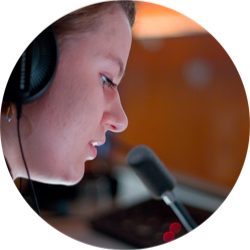
Check-list for using conference interpreters
- How many and which different languages should be actively spoken at your conference ?
- In how many and which different languages should the audience be able to listen?
- Is the conference scheduled in just one location or will it circulate?
- Are break-outs/parallel groups planned?
- For how many people in total should interpreting be provided?
- Should all languages be interpreted the entire time?
- What technical equipment is already available at the venue?
- What technical equipment is included in your conference package?
- Do you also require interpreting at a fringe event?
- Is there a specific dress code for the interpreters?
- Should the interpreters eat with the group or separately?
- Do you also require interpreting for lunch?
- Who is the contact person for the interpreters on site?
- When should the interpreters arrive? The clock starts ticking at this time, even if the meeting starts later.
Conferences are usually dedicated to specific topics, are scheduled for one single or several days, and are attended by anything between several dozen and a few hundred participants, most of whom are experts in the relevant field. As a rule, lectures and panel discussions dominate and often end with a question and answer session.
In the vast majority of cases, conferences are translated simultaneously into and from two or more languages requiring a simultaneous interpreting system that is installed and maintained by specialised technicians and whose composition depends on the particular circumstances of the conference.
ad hoc offers you experienced conference interpreting professionals who can quickly familiarise themselves with any topic and smoothly translate your presentations for a satisfied audience because, after all, once it is out there there is no second chance for patching up a dodgy oral translation.

